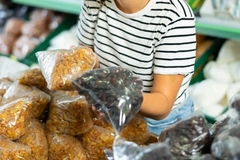Circularity Scotland gives £22M to build “most comprehensive” DRS in the world
23 Feb 2023 --- Circularity Scotland has announced £22 million (US$26.5 million) of cash flow support measures to help Scotland’s brewers, distillers, importers and drinks manufacturers prepare for the introduction of Scotland’s deposit return scheme (DRS).
The support package is designed for the government’s “scheme administrator” to help small and medium-sized enterprises, who have previously voiced concerns about the scheme’s impact on their business’ cash flow.
To address these concerns, Circularity Scotland is removing the day-one and month-one charges for all producers up to a threshold of three million units per year. It also provides two-month credit terms on deposits and fees up to the same volume threshold to reduce the working capital impact on all producers.

“DRS in Scotland is one of the most important environmental infrastructure projects ever introduced in the UK and the most comprehensive DRS anywhere in the world,” David Harris, chief executive at Circularity Scotland, tells PackagingInsights.
“By ensuring that billions of drinks containers imported, produced and sold each year do not end up as waste, the scheme will transform how the country recycles and protects our environment for generations to come. The challenges of building this scheme from scratch are significant but are dwarfed by the environmental benefits of getting this right.”
Equal support
Circularity Scotland is a commercially operated, not-for-profit organization that has been established by producers, retailers and hospitality operators to deliver the DRS for Scotland from August 16, 2023.
The three million unit threshold has been established to ensure that the thousands of smaller-scale producers selling in Scotland benefit more proportionately from the cash flow support.
Circularity Scotland says the move will particularly help companies like craft brewers, wine importers and craft spirit producers. The two-month credit terms will be made available to all producers, regardless of their size, ensuring all producers within the scheme are treated equally.
David Harris, chief executive at Circularity Scotland.The non-profit has also confirmed that it will offer the option to use self-adhesive barcode labels for producers placing less than 25,000 units per year of a specific product onto the Scottish market.
This provides a simple and straightforward administrative solution for independent producers and importers for whom the cost of changing packaging to introduce new barcodes could be prohibitive, Circularity Scotland shares.
Ensuring a well-working DRS
Harries stresses the organization is aware that smaller producers, in particular, have been concerned about the cash flow impacts of the scheme and the financial measures will address those concerns.
Circularity Scotland has successfully secured over £100 million (US$120.6 million) of third-party funding to establish the infrastructure of the DRS, with only minimal up-front funding from the very largest producers.
This funding approach allows producers to benefit on equal terms from this investment in world-class infrastructure and leading-edge technology and only pay their share of the costs once the scheme is operational.
“We have already announced reductions in producer fees of up to 40% while also being able to offer the highest return handling fees of comparable schemes anywhere in the world,” explains Harris.
“These additional support measures further demonstrate our confidence in being able to deliver ongoing operational efficiencies once the scheme has gone live. We are committed to ensuring that the DRS works for Scotland, is cost-effective for business and helps protect our environment for generations to come.”
Cutting emissions
Circular economy minister Lorna Slater highlights that the cash flow support addresses initial cash flow challenges and provides a pragmatic and simple solution to the issues raised around barcodes for smaller product lines. “This is a package that gives businesses the clarity and confidence they need to be part of Scotland’s DRS.”
“By working together, we can lead the UK in delivering a DRS that will increase Scotland’s recycling rates from around 50% to 90%, cut emissions, tackle littering and address public concerns about the impact of plastic and other waste,” Slater says.
Harris adds that Circularity Scotland recognizes that there are still challenges for businesses and the organization aims to help companies work through these. “By working together, we will ensure the scheme is a success,” he says.
“We will continue to engage closely with businesses across Scotland to help them prepare for the introduction of the scheme. The most important piece of information drinks producers and importers need to know right now is that they must be registered with the DRS scheme regulator, Single Euro Payments Area, by February 28 if they want to continue selling drinks in glass and plastic bottles, or in cans, in Scotland after August 16, 2023. While businesses can register themselves, Circularity Scotland can do this on their behalf,” Harris concludes.
By Natalie Schwertheim













